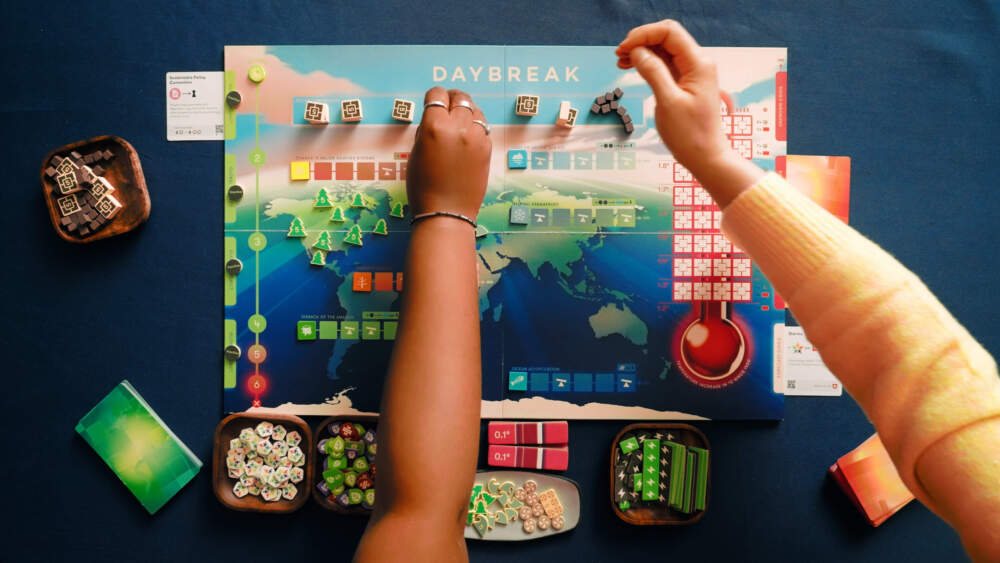Advertisement
'Daybreak' board game tasks players to collaborate to stave off climate change
Resume
I flip up a card. Everyone at the table huffs in frustration after reading its name — “Fossil Fuel Subsidies.” It’s the most devastating crisis we’ve yet endured in the new cooperative board game, “Daybreak” — and we’ve got two turns left before complete climate collapse.
The player acting as the U.S. has to shelve some Solar Research & Development to pay for the card, but, thankfully, he’s already completely greened his electrical grid. Europe’s not far behind — and together with the rest of the world, the team’s managed to reforest most of the globe, restoring crucial carbon sinks.
We scheme and strategize through the next round and turn to the game’s most dreadful step when we flood the board with gray “carbon cubes.” But this time, miraculously, we’ve managed to sequester them all. We shrug off one last crisis round and break out into celebration. We’ve reached drawdown — the world is saved.
That’s just one path to victory in “Daybreak,” which has crested over a recent wave of ecological board games.
“What we're trying to do is help people understand that this is a very complex problem that can only be solved if we work together,” says co-designer Matteo Menapace. “Instead of trying to overcome each other, we are working together to solve something quite complex and quite urgent.”
Menapace created the game with Matt Leacock, the industry legend behind the ubiquitous “Pandemic” franchise (which took off long before COVID-19 made its theme all too real). “Daybreak” takes on a similarly global scope, tasking players to embody whole regions: the U.S., Europe, China, and “Majority World,” which Leacock defines as “folks that have contributed the least to emissions and are going to feel the worst effects of it.”
Leacock and Menapace consulted with environmental groups like the Red Cross Red Crescent Climate Center, the World Wildlife Fund, and Greenpeace, to ensure the game modeled real science and policy ideas. Each card, which represents concepts ranging from “Geothermal Plants” to “Green Quantitative Easing,” comes with a QR code that players can scan to read pages written by climate experts. These entries often include a “take action” section, which recommends activism that can be either mushy (“Value and pursue your own education”) or hyper-specific (“Join a degrowth campaign or network“).
The game’s designers also wanted to walk the environmentalist talk in the game’s production. “Daybreak” doesn’t ship in shrinkwrap or contain any plastic pieces — it’s made of biodegradable materials like cardboard and wood. Leacock and Menapace even changed core designs to be more sustainable. After a consultant told them a cloth bag “would add quite a bit carbon footprint,” says Menapace, “we had to redesign that part of the game and instead replace that cloth bag and all the bits inside that cloth bag with dice.”
Wonky as “Daybreak” might be, Leacock doesn’t want it to feel like trying to get a kid to eat their spinach: “That's sort of like taking broccoli, dipping it in chocolate and saying, ‘Hey, this is great’ Instead, it's more like, ‘Hey, there's this great game and it's an excuse to talk about the climate crisis and internalize what the problem is. By playing it, you really see that it's going to be a very multifaceted, sort of all hands on deck kind of thing.’”
James Perkins Mastromarino produced and edited this interview for broadcast with Ahmad Damen. Perkins Mastromarino also adapted it for the web.
This segment aired on May 2, 2024.


